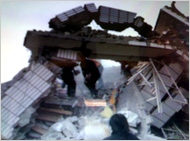By ANDREW JACOBS
BEIJING — A powerful earthquake in northwest China killed at least 300 people, injured 8,000 and left many others buried under debris on Wednesday, Chinese state media reported.

Zhang Hongshuan/Xinhua, via Reuters
A photo taken by a mobile phone showed destroyed houses after an earthquake hit the Tibetan Autonomous Prefecture of Yushu, northwest China’s Qinghai province on Wednesday.

The New York Times

Zhang Hongshuan/Associated Press
Rubble from destroyed houses fills the streets.

Zhang Hongshuan/Associated Press
People gathered in open areas after the quake hit.
The quake, which struck at 7:49 a.m. in Qinghai Province, had a magnitude of 7.1 according to China’s earthquake administration.
According to the China Earthquake Networks Center, the earthquake struck in Yushu County, a remote and mountainous area sparsely populated by farmers and herders, most of them ethnic Tibetans. The region is pocked with copper, tin and coal mines and rich in natural gas. A government Web site said the county’s population was around 80,000.
China National Radio said that more than 80 percent of the homes in the area had collapsed but that schools and government buildings had largely remained standing.
Karsum Nyima, an employee of a local television station in Yushu, told the national television broadcaster, CCTV, that the quake had sent people running into the streets.
“All of a sudden, the houses collapsed,” he said. “It was a terrible earthquake. In the park, a Buddhist pagoda fell down. Everyone is in the street in front of their houses. They are trying to find family members.”
In the same broadcast, Wu Yong, an officer in the Chinese Army, said that the road to the airport was impassable and that soldiers were digging out people from collapsed homes by hand.
“The most important thing now is that this place is far from everything, with few accessible rescue troops available,” Mr. Wu said. “I feel like the number of dead and injured will keep going up.”
Local officials said that phone service was limited and that rescue efforts were stymied by a lack of heavy equipment. Medical supplies and tents, they added, were in short supply.
State news media reported that 700 paramilitary officers were already working in the quake zone and that another 3,000 troops would be sent to the area to assist in search and rescue efforts. The civil affairs ministry said it would also send 5,000 tents and 50,000 blankets.
Last August, Golmud was hit by a 6.2 magnitude earthquake that destroyed dozens of homes but caused no deaths. Qinghai is an ethnic melting pot of Tibetans, Mongols and Han Chinese. It is adjacent to Sichuan Province, where at least 87,000 people died in a powerful earthquake in 2008.
Xiyun Yang contributed research.
